 klaus-michael schneider
klaus-michael schneider
Keywords: colombia | custom | ensign |
Links: FOTW homepage | search | disclaimer and copyright | write us | mirrors

FOTW beschäftigt sich mit der Wissenschaft der Vexillologie (Flaggenkunde).
Alle auf dieser Website dargebotenen Abbildungen dienen ausschließlich der Informationsvermittlung im Sinne der Flaggenkunde.
Wir distanziert uns ausdrücklich von allen hierauf dargestellten Symbolen verfassungsfeindlicher Organisationen.
Last modified: 2021-08-26 by  klaus-michael schneider
klaus-michael schneider
Keywords: colombia | custom | ensign |
Links: FOTW homepage |
search |
disclaimer and copyright |
write us |
mirrors
See Also:
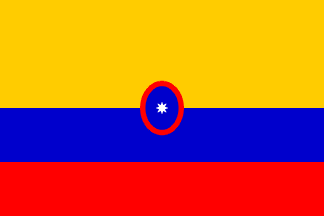 (2:3)
(2:3) 
image by Željko Heimer, 17 May 2001 (According to [pay00])
The flag used by civil ships is yellow, blue, red 2:1:1, with
a red bordered blue oval with white eight pointed star in the
middle.
Željko Heimer, 8 December 1995
According to [pay00] - Civil
Ensign (---/C-- (2:3)) - National flag with the blue oval
bordered red with eight-pointed white star in the middle. This
same flag is hoisted also on diplomatic missions abroad. Surely,
this practice is due to avoid confusion with Ecuatorean missions.
Also, this flag is not to be confused with the Diplomatic and Consular Flag which is the
honourary flag hoisted on ships only to signify that a high
diplomatic officer is aboard. Compering to the legislation -
Civil ensign shown in Album is having to large the cental emblem.
Željko Heimer, 16 May 2001
Article 2 - the merchant ensign of Colombia is as it was
established in the decree number 309 of 1980 (sic! maybe 1890?),
three meters long and two meters wide, defaced in the middle with
an oval shield of blue field encircled with a zone of red
(velvet?) five centimeters wide and with a white eight-pointed
star in the center, ten centimeters in diameter. The axes of the
oval, within the blue filed, are forty centimeters the larger one
and thirty centimeters the smaller one.
Paragraph: This should be the ensign used on the ships of the
Colombian [Merchant] Marine and on the offices of the Consulates
accredited abroad.
Željko Heimer, 17 May 2001
There are construction details in the law. Flag is 300 x 200
cm. Blue oval is 40 cm high and 30 cm wide, red ring around is 5
cm.. [zna99] shows it correct.
Ralf Stelter, 17 May 2001
One comment to the putative using the civil ensign by
Colombian diplomatic missions: the Colombian embassy in Prague
uses the national flag, not the ensign. If the Colombian civil
ensign would in fact be used by the diplomatic missions, it is
the state flag, isn't it? It should be labelled as -S-/C--.
Jan Zrzavy, 20 and 26 May 2001
This would mean that the role of state flag on land (-S-/---)
belongs indistinctly to two different flag. Can it be so?
Antonio Martins, 28 May 2001
Yes. Absolutely. There are many examples of such cases.
Remember that the "dot system" is only informative and
orientational and many countries have their
"specialities" which make often cases of two (or more)
flags that could be used (maybe only in certain circumstances)
for one of the uses in the "dot spaces".
Željko Heimer, 28 May 2001
Columbia has a distinctive civil ensign, apparently because
its national flag is too similar to that of Ecuador. Therefore it
seems strange that the national flag is said to be also the state
ensign, for that would still cause confusion with the Ecuadorian
flag. In my opinion, there are two real possibilities: one is
that the civil ensign being also the state ensign, the other is
that the war ensign being also the state ensign.
Miles Li, 29 May 2001
The civil ensign is distinctive from that of Ecuador as it has
a seal while Ecuador uses her plain flag.
The state flag of Colombia is plain while that of Ecuador has the
Coat of Arms in it. So both do not cause any confusion. The
national flags or civil flags - both plain - are flown by the
inhabitants of either country. So there will be no confusion as
the inhabitants will surely know in which country they live and
fly their flag. The civil ensign of Colombia is also a state
flag, but only for special occasions, i.e. for embassies,
consulates and foreign dependencies of the government, so it
should be possibly named "state flag in foreign
countries" or "state flag abroad". So the
confusion is also avoided. But: The Colombian embassy in Berlin
uses the plain flag outside their building, while inside the flag
of the ambassador shows the badge. The secretary of the embassy
told me: "The badge or seal is stitched onto the flag and it
would never be used outside. This flag is the personal flag of
the ambassador or any official dealing with Colombian affairs.
The flag hoisted outside should normally be with the seal, but is
used without as it is distinctive from Ecuador's flag - they use
the flag with CoA - and it does not matter which flag - the one
with seal or the plain flag - is used." So the flag with
seal should possibly be named "state flag abroad,
alternate"...
Ralf Stelter, 29 May 2001
What I am really talking about is the State Ensign afloat, not
the State Flag on land. If a distinctive civil ensign exists to
distinguish Columbia from Ecuador, why not the state ensign?
Miles Li, 29 May 2001
Merchant ships, both in sea and in the air, use the civil
engine. I am not sure about actual custom at see, but they
are supposed to fly it, and all commertial aircrafts have it
painted (some times with a circle instead of an oval, and many
times with a five pointed star). Here in Bogotá, nobody
flies the civil engine, I would dare that very few people would
even recognize it. I can't remember any time I have seen
that flag flying from a pole on land, and as I live quite away
from the sea, I cannot check right now if it is actually used on
boats.
Carlos Thompson, 24 March 2003
According to my notes, " ...the eight-pointed star is
that of the former Federation of Gran Columbia which was
dissolved in 1830", and to which, of course, Columbia
belonged. Also according to my notes, "This flag (the
Civil Ensign that is) was adopted by Article 2 of Decree No. 309
of 8 May 1890".
Christopher Southworth, 1 December 2003
I wonder if anybody can give me the correct date for the
specification of the Columbian Civil Ensign?
We give 11 May 1934 as the date of Decree No. 861, and I have May
11 1924?
We also give "1980" as the date of Decree 309 which
established the flag, whereas the true year is 1890.
I can report that the year 1934 for specification of the Civil
Ensign (and shown on the official website), is contradicted by:
'Heraldica nacional: estudio documental' by Enrique Ortega
Ricaurte (Bogota, Publicaciones del Banco de la Republica, 1954)
says 17 May 1924, and that the decree was published in the Diario
Oficial no.19607 of 24 May 1924 pp 455-56.
According to this source there was a decree in 1934, which
altered the shape of the shield of the national arms, but this
was repealed in 1949.
Christopher Southworth, 5 and 8 January 2004
Decree dated 1924 ratified the state flag as was according the
previous law of 1906 and established it as naval ensign. Law of
14 July 1906 (Decree 844) also ratified the previous flag.
The first adoption was by decree 26 November 1861. See on
<www.angelfire.com/realm/jolle/colombia/colombia-eucolombia.htm>
and <www.angelfire.com/realm/jolle/colombia/colombia-repcolombia.htm>.
Jaume Ollé, 12 January 2004
I supose that 1934 was the year current law reglamenting flag
use was issued, but this does not mean that the flag was adopted
that year.
I took my New Year holidays at Cartagena. All civil ships I could
see used the plain Y-B-R 2:1:1 horizontal tricolor, with no
shield and no star, and any ratio. I could not see,
however, the flag of any merchant ship, which I presume are the
ones using the starred flag.
Carlos Thompson, 9 January 2004
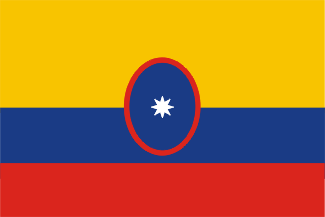
image by Jaume Ollé, 27 October 2001
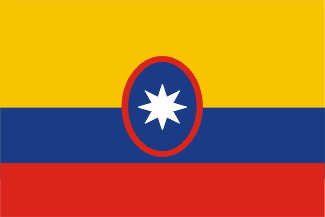
image by Jaume Ollé, 27 October 2001
The other day I saw something strange in Lisbon: In front of
the HQ of the Ibero-American Capital Cities' Association, a row
of poles with all member states flags included for Colombia its civil ensign - and the large
oval variant of it at that, instead of the usual civil flag.
António Martins-Tuválkin, 11 August 2005

image by Željko Heimer, 17 May 2001
1 unit = 5 cm.
The reason that Željko's construction diagram does not
contain any details of the star is because Decree 861 of 17 May
1924 that defined the flag did not specify any. My own
specifications simply creates the star by using a central circle
one-half the diameter of the outer, and as far as I know this is
pretty much a default size (for stars with over five points) in
the absence of official information to the contrary.
Christopher Southworth, 21 November 2005
I have made the star to be equal as if it was made as an
octagram connecting each third vertex. This produces the inner
circle approximately 0.54 of the outer. This matches well with
the Album 2000, my primary source for these images (including the
air force rounde using the same star). If there is no evidence
for other, this seems a reasonable assuption. In this case the
difference between 0.54 and 0.5 inner diameter is probably hard
to notice and both would do in practice equally well, I guess.
Željko Heimer, 25 November 2005
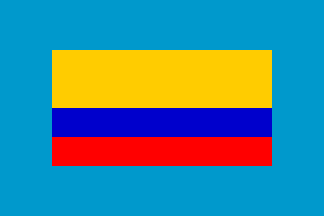
image by Željko Heimer, 23 May 2001
National flag with a large blue border.
Source: Album des Pavillons (1995) [pay].
Ivan Sache, 12 August 1999
According to [pay00] - Customs
(2:3) - National flag with blue border (i.e. similar to port capitains flag but with blue
border). The blue border in Album 2000 is light blue. Previous
Album issues had that border of the same blue as the middle
stripe, but similarly with discussion regarding other flags with
this "duality" the Album 2000 images are supposedly
correct (or more correct then others, it may easily be that in
practice the difference is not observed).
Željko Heimer, 23 May 2001
Flaggenbuch (1939) already showed the flag. The customs ensign
has the same pattern as port
capitain, but with a blue border. Anyway, the figures are
slightly different: height of the horizontal blue borders: 46
each.
Therefore, the national flag inside the blue border should be
108:204 (figures not mentioned on the image). Its stripes are
50:24:24, from top to bottom. There is something wrong in
Flaggenbuch figures in this case!
Ivan Sache, 24 May 2001
In Flaggenbuch the blue border of the customs ensign has the
same shade as the blue stripe in the national flag it surrounds.
After rechecking the image, I an confirm that Flaggenbuch indeed
shows a slightly off-centered Colombian flag in the Port
commander's flag. The image agrees with the numbers put on it,
and I cannot imagine Neubecker making two mistakes in the same
flag.
Ivan Sache, 27 May 2001
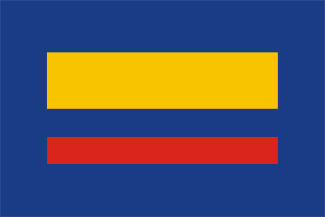
image by Jaume Ollé, 5 November 2001
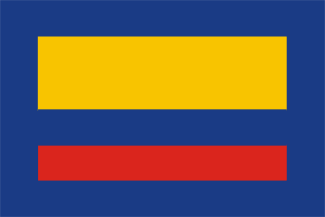
image by Jaume Ollé, 5 November 2001
Images according to Flaggenbuch and others inc. Restrepo
Uribe.
Jaume Ollé, 5 November 2001
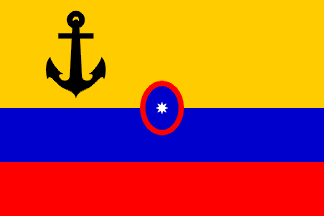 (2:3)
(2:3) 
According to [pay00]
image by Željko Heimer, 20 May 2001
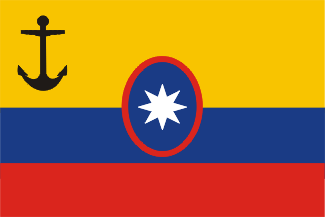 (2:3)
(2:3) 
Variant (?)
image by Jaume Ollé, 5 November 2001
According to [pay00] -
Merchant ships whose captain is Navy officer (reserve) (---/C--
(2:3)) - The same design as the civil ensign with addition of a
black anchor in canton. This flag should maybe more simple be
called "Reserve ensign" as this is the English term
that covers it.
Željko Heimer, 20 May 2001
Hosted by: Fanshop-Online.de und Handy-Shop.de
Tipp: Apple iPhone 12 im Shop